六年级上英语提纲
陕旅版六年级英语(上册)总复习提纲

陕旅版六年级上册英语复习提纲一.重点句子句型Unit 11. -What are you doing, Wu Chen? - I’m having a rest.2. But it’s time to learn English.3. It doesn’t matter.4. Take out your English book, please.5. I’m afraid you can’t.6. I’ll play the violin right now.7. On Saturday morning, Li Shan always gets up at half past six.8. She plays it for an hour.9. You’ll have no time to have breakfast.10. Then she brushes her teeth and washes her face.Unit 21.You look healthy.2.I always eat healthy food and I like sports.3.--How often do you drink milk? -- I drink milk every day.4.My mom says it’s good for me.5.She goes to bed early and sleeps nine hours every night.6.She goes skating twice a week and goes boating in the park once a month.7.Kitty’s favorite sport is ping-pong.8.She does well in her study because she eats well, sleeps well and plays well.9.I don’t like fruits or vegetables.10.--How often does she play tennis? --She plays tennis twice a week. Unit 31.What’s the matter? = What’s wrong? = what’s up? (with you)2.Some more soup, dear?3.But I have no time. I have to clean my bike.4.Why not go in your dad’s car?5.We shouldn’t drive the car today.6.It’s time to do something for our earth.7.Why? Because today is World Car Free Day.8.We all live on the earth.9.There are a lot of trees, flowers, rivers and mountains on the earth.10.But sometimes we do bad things to it.11.We cut down too many trees and waste too much water.12.We have only one earth. We should care for it.13.We should do something to make the water and the air clean again. Unit 41.--What do you often do on weekends?-- I usually go to the park and fly a kite.2.Are you free next Saturday?3.Let’s go on a picnic at the foot of the mountains.4.Why not have the picnic in the park? Good idea.5.Shall we meet at the gate of the park?6.What shall we take?/When shall we meet?/Where shall we meet?7.We shall get to the park early and come back early.8.The children would like to go on a picnic at the foot of the mountains.9.Would you like some chicken? No, thanks.10.How about going to the Old People’s Home?11.I’d like an apple.12.Alice is taking the food out of the basket.13.I’m a little hungry.Unit 51.What a heavy rain.2.It was here just now.st night, they were under your bed.4.It was in front of the house yesterday.5.I’m afraid it was lost. You have to walk to school today.6.Were you at this school thirty years ago? Yes, I was. /No, I wasn’t.7.Was there a library? Yes, there was./ No, there wasn’t.8.Were there any trees? Yes, there were. / No, there weren’t.9.But there weren't so many books in it.10.But the school was small at that time.Unit 61.What did you do last weekend? I did some housework.2.They were busy. My father had some work to do. He went away from home early in the morning.3.She was in the hospital. My grandma was ill and my mother looked after her there.4.She is better now.5.I went to see some friends and we had a football match.6.What show did you watch? I watched a show about a Shaanxi girl.7.What happened to her? When she was 8 years old, her mother was ill in bed. She did all the housework by herself.8.She looked after her mother for some years.9.And she did very well in her study.10.What a good girl!Unit 71.Did you go out to play last weekend? No, I didn’t.2.I stayed at home.3.I learned to cook and made a big cake by myself.4.I flew to Hainan with my family.5.I swam in the sea and played beach volleyball with my uncle and cousin.6.Sounds interesting. Did you eat any sea food?7.They went there by train and stayed in Beijing for three days.8.They took many photos there.9.On the first day,... The next day,... The las t day… 第一天……第二天……最后一天……10.They really had a good time.Unit 81.What do you think of our party? It was great.2.They acted it well.3.I think everyone had a good time.4.At seven o’clock, everything was ready.5.There were many colorful lights and balloons in it.6.At the beginning, all the students sang Happy New Year together.7.Then, Li Shan and Wu Chen acted a short play about a poor girl. It made many students cry.8.After that, Liu Zhaoyang told a joke. It was funny and made everyone laugh.9.Finally, the students played some games. Everyone was excited.10.It was really a great party.11.Class One had a New Year’s party on December 31st.二.语法回顾1. there be句型的一般过去时运用一般疑问句---Was/Were (+冠词) +名词... ?---Yes, there was/were. / No, there wasn’t / weren’t. 陈述句---There was/were +某人/某物+某地(+过去的时间)。
六年级英语上册课程纲要
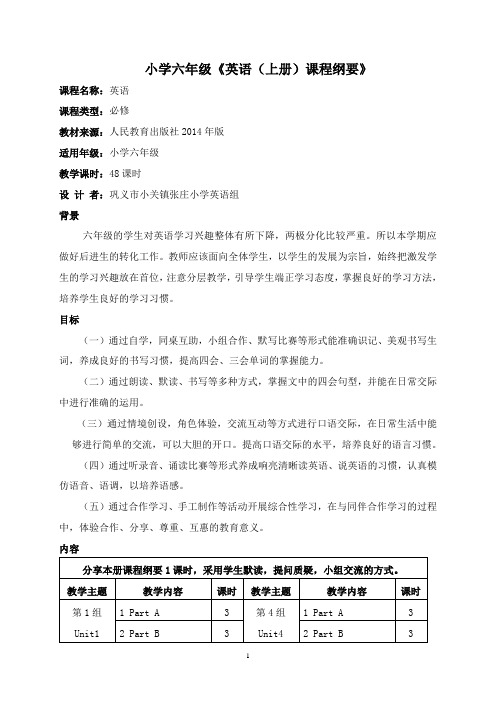
小学六年级《英语(上册)课程纲要》课程名称:英语课程类型:必修教材来源:人民教育出版社2014年版适用年级:小学六年级教学课时:48课时设计者:巩义市小关镇张庄小学英语组背景六年级的学生对英语学习兴趣整体有所下降,两极分化比较严重。
所以本学期应做好后进生的转化工作。
教师应该面向全体学生,以学生的发展为宗旨,始终把激发学生的学习兴趣放在首位,注意分层教学,引导学生端正学习态度,掌握良好的学习方法,培养学生良好的学习习惯。
目标(一)通过自学,同桌互助,小组合作、默写比赛等形式能准确识记、美观书写生词,养成良好的书写习惯,提高四会、三会单词的掌握能力。
(二)通过朗读、默读、书写等多种方式,掌握文中的四会句型,并能在日常交际中进行准确的运用。
(三)通过情境创设,角色体验,交流互动等方式进行口语交际,在日常生活中能够进行简单的交流,可以大胆的开口。
提高口语交际的水平,培养良好的语言习惯。
(四)通过听录音、诵读比赛等形式养成响亮清晰读英语、说英语的习惯,认真模仿语音、语调,以培养语感。
(五)通过合作学习、手工制作等活动开展综合性学习,在与同伴合作学习的过程中,体验合作、分享、尊重、互惠的教育意义。
内容实施(一)课程资源1.义务教育课程标准实验教科书,六年级英语上册,人民教育出版社。
2.课内资源:利用教材中的Let’s start部分引入、PartA、B Let’s learn的单词学习、Let’s talk课文对话、Let’s read阅读短文、Let’s try和Let’s check 的听力理解、Task time的合作学习、Pronunciation的音标练习等进行学习,整合单元内容。
3.课外资源可利用“班班通”等现代科技手段学习英语的视野和空间;还要通过阅读书报杂志、上网、收看电视、实地参观调查、开展朗读比赛、情境交际等方式,拓宽英语的学习和运用的领域,提高学习的效率。
(二)教/学活动单词理解(Let’s learn)用Let’s start理解学习新词和新句型,在实际交流当中学单词,在丰富的语言活动当中操练新词,将词汇与句型的教学融会贯通。
Unit1HowcanIgetthere复习提纲(知识清单)人教PEP版英语六年级上册
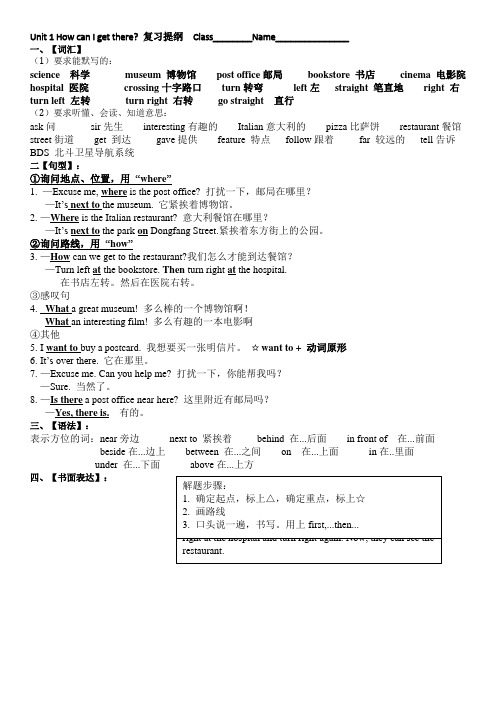
Unit 1 How can I get there? 复习提纲Class________Name_______________一、【词汇】(1)要求能默写的:science 科学museum 博物馆post office邮局bookstore 书店cinema 电影院hospital 医院crossing十字路口turn转弯left左straight 笔直地right 右turn left 左转turn right 右转go straight 直行(2)要求听懂、会读、知道意思:ask问sir先生interesting有趣的Italian意大利的pizza比萨饼restaurant餐馆street街道get 到达gave提供feature 特点follow跟着far 较远的tell告诉BDS 北斗卫星导航系统二【句型】:①询问地点、位置,用“where”1. —Excuse me, where is the post office? 打扰一下,邮局在哪里?—It’s next to the museum. 它紧挨着博物馆。
2.—Where is the Italian restaurant? 意大利餐馆在哪里?—It’s next to the park on Dongfang Street.紧挨着东方街上的公园。
②询问路线,用“how”3.—How can we get to the restaurant?我们怎么才能到达餐馆?—Turn left at the bookstore. Then turn right at the hospital.在书店左转。
然后在医院右转。
③感叹句4.What a great museum! 多么棒的一个博物馆啊!What an interesting film! 多么有趣的一本电影啊④其他5.I want to buy a postcard. 我想要买一张明信片。
完整版)人教版六年级英语上册知识点汇总总结提纲
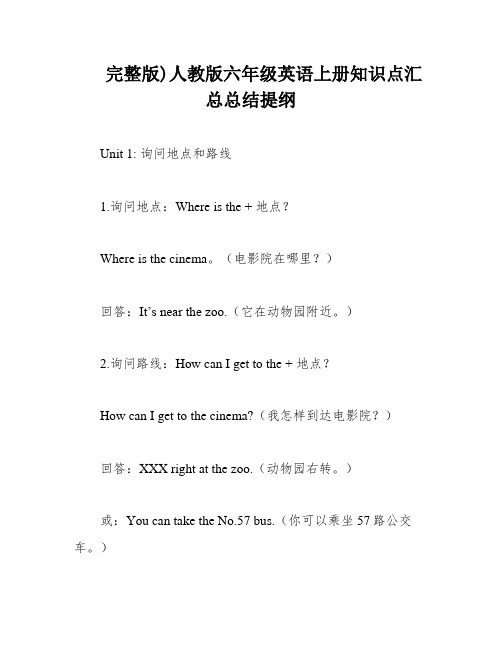
完整版)人教版六年级英语上册知识点汇总总结提纲Unit 1: 询问地点和路线1.询问地点:Where is the + 地点?Where is the cinema。
(电影院在哪里?)回答:It’s near the zoo.(它在动物园附近。
)2.询问路线:How can I get to the + 地点?How can I get to the cinema?(我怎样到达电影院?)回答:XXX right at the zoo.(动物园右转。
)或:You can take the No.57 bus.(你可以乘坐57路公交车。
)Unit 2: 交通方式1.询问某人怎样去某地:How do某人go(come) to + 地点?How do you go to school?(你怎么去学校?)回答:I go to school on foot.(我走路去学校。
)2.规定某人必须做某事:某人 + must + 动词原形XXX.(骑自行车的人必须戴头盔。
)I must pay n to the traffic XXX.(我必须注意交通信号灯。
)Unit 3: 打算做某事某人 + be going to + do(动词原形)She is going to see a film.(她打算去看电影。
)My uncle is planningXXX to go to the supermarket。
In this unit。
there are several types of ns that we can use to XXX。
For example。
we can ask "What are you going to do (+time or place)?" or "When are you going (+place)?" to get an XXX may include phrases such as "I am going to the cinema tomorrow" or "They are going to Nanjing next week."Similarly。
六年级英语知识点提纲
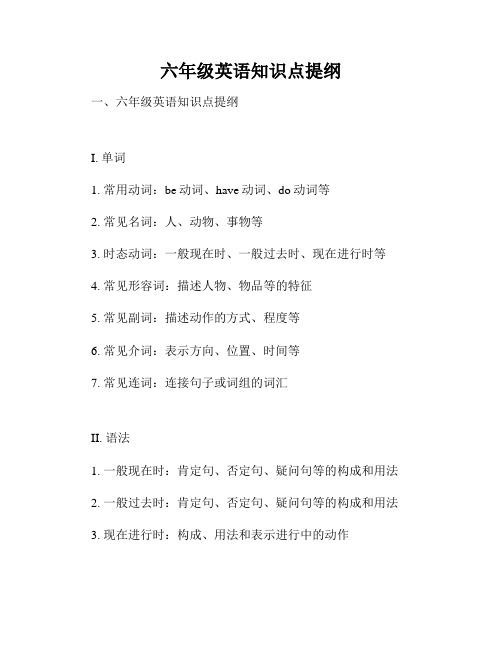
六年级英语知识点提纲一、六年级英语知识点提纲I. 单词1. 常用动词:be动词、have动词、do动词等2. 常见名词:人、动物、事物等3. 时态动词:一般现在时、一般过去时、现在进行时等4. 常见形容词:描述人物、物品等的特征5. 常见副词:描述动作的方式、程度等6. 常见介词:表示方向、位置、时间等7. 常见连词:连接句子或词组的词汇II. 语法1. 一般现在时:肯定句、否定句、疑问句等的构成和用法2. 一般过去时:肯定句、否定句、疑问句等的构成和用法3. 现在进行时:构成、用法和表示进行中的动作4. 比较级和最高级:形容词的比较级和最高级形式的构成和用法5. 名词所有格:表示所有关系的名词的构成和用法6. 介词短语:表示时间、地点、原因等的介词短语的使用7. 人称代词:主格和宾格的用法及其在句子中的作用III. 句型1. There be句型:表示事物存在的句型构成和用法2. 简单句:主语+谓语+宾语的句子构成3. 并列句:两个或多个简单句并列构成的句子4. 复合句:主句和从句构成的句子IV. 阅读理解1. 短文阅读:理解短文的主旨、大意以及具体细节2. 根据短文回答问题:根据短文内容回答问题3. 补全对话:根据对话的语境选择正确的选项V. 写作1. 句子写作:根据所学的语法知识编写正确的句子2. 简单段落写作:组织句子和观点,写一段简短的小作文VI. 听力1. 听力材料:听懂日常对话和简短故事2. 根据听到的内容回答问题:根据听到的对话或短文回答问题3. 听写:听写所听到的单词、句子或短文VII.口语1. 日常用语:问候、道歉、感谢、请求等常用表达方式2. 简单对话:根据给定情境进行简单的日常对话练习以上是六年级英语的知识点提纲,通过学习以上内容,能够更好地掌握英语的基础知识,提高听说读写能力。
请学生们按照教师的指导和布置的任务进行学习和练习,以便更好地应对即将到来的考试和实际运用中遇到的问题。
人教版六年级英语上册复习提纲Unit 4-Unit 6

六年级上学期英语复习提纲Unit4—Unit6Unit4Accident一、基础词汇am/is-was are-were have-had break-broke go-went cut-cut put-put find-found come-came see-saw fall-fell accident事故safe安全的pad软垫belt安全带bottle瓶子matter问题deep深的village村庄keep to遵守...take care当心put away拿走...hospital医院left左边的right右边的arm手臂leg腿bandage绷带broken破碎的二、基本句型1.When I was...I had an accident with...当我......岁.....时我遇到了一场事故。
2.I/He/She broke my/his/her...我/他/她摔破了我的/他的/她的......3.-Did...have an accident when...was/were...?谁......岁时有过一场事故吗?-Yes,...did./No,...didn’t.是的。
/不是。
4.-What’s the matter with you?你怎么啦?-My...hurts.我的......疼。
5.Don’t forget.../Please remember...不要忘记……/请记住……。
三、基础语篇1.When I was eight,I had an accident with my bike.I broke my leg and my right arm.I was in hospital for four weeks.当我八岁时,我骑自行车时发生了一场事故。
我摔破了我的腿和我的右胳膊。
我在医院里呆了四个星期。
st year Joseph was on holiday with his parents.One day he went swimming.He cut his foot ona broken bottle.His mum put a bandage round it.去年Joseph和他的父母外出度假。
外研社版三起小学英语六年级上册温习提纲M1M5

六年级温习教案Module 1重点单词:1. postcard2. more 更多3. thousand 一千4. kilometre 千米5. million 百万6. Mexico 墨西哥7. Canada 加拿大8. 方位名词东east 南south 西west 北north 重点短语:1. look at 看2. a picture of the Great Wall 一副长城的图片3. day and night 日夜4. tell me more about……告知我更多关于……的事5. in the east of America 在美国的东部6.something about Beijing关于北京的一些事7. lots of 许多8. from…to…从……到……9. a map of America 一副美国地图10. in New York 在纽约11. eight million people 八百万人口12. six thousand seven hundred kilometers 六千七百米重点句型1. How long is it? 它有多长?It’s about six thousand seven hundred kilometers. 它大约六千七百米长。
2. How big is it? 它有多大?It's got eight million people. 它有八百万人口。
3. You tell me more about New York. 告知我更多关于纽约的事。
4. 感叹句What + a/an +形容词+名词!What a big map of America! 何等大的一张美国地图啊!5. He’s in New York with his cousin, Simon. 他和他的表哥西蒙在纽约。
Module 2重点单词:1. miss 思念2. sometimes 有时3. restaurant 饭馆4. really 真的5. dancing 舞蹈6. square 广场重点短语:1. ride bicycles to work 骑自行车去上班2. send an email to my family 发送一封电子邮件给我的家人3. miss china 想念中国4. go to Chinatown 去唐人街5. want to do 想要干6. Chinese restaurants 中餐馆7.Chinese dancing 中国舞蹈8. go to Chinatown 去唐人街9. the Changjing River 长江10. the Tian’anmen Square 天安门广场11. the Huangshan Mountain 黄山12. the West Lake 西湖重点句型1. There is a Chinatown in New York. 纽约有一个唐人街。
六年级上英语M6-M10复习提纲_外研社

六年级上英语M6-M10复习提纲_外研社Module 6重点单词1. someday将来2. chopsticks筷子(复数)3. soon不久,很快4. knife 餐刀,小刀5. fork叉子重点短语1. a postcard from New York 来自纽约的一个明信片2. go swimming 去游泳3. a Chinese kite 一个中国风筝4. in the park 在公园5. a book about America关于美国的一本书6. write to 写给7. have/has got a cold感冒8.a knife and fork 一副刀叉 9. stamps from China 来自中国的邮票重点句型1.I have got some chopsticks, but they are difficult. 我有一些筷子,但是他们用起来很困难2. Daming has got a Chinese kite and we fly it in the park. 大明有一个中国风筝,我们在公园里放风筝。
3. Have you got a book about America? 你有一本关于美国的书吗?I can send you one.我可以寄给你一本。
4. I haven’t got a football but I’ve got a basketball. 我没有足球,但是我有一个篮球。
Module 7重点单词1.believe 相信2.lucky幸运的3.bamboo竹子4. CD-ROM只读光盘5. copy模仿6. fantastic 非常好的, 很棒的重点短语1. twelve hours a day 一天十二个小时2. sleep in the winter 冬眠3. eat bamboo吃竹子4.play with 和……玩耍5. come out of the box 从盒子里出来6. a fantastic present 一件非常棒的礼物7. another snake = the other snake 另一条蛇8. learn...from... 从......学到......9.believe it or not 信不信 10. look at this picture 看这张照片11. believe it or not 不管你信不信 12. live in a tree住在树上 13, give Daming a present重点短语1. the UN building 联合国大楼2. bring peace to the world给世界带来和平3. building in New York 在纽约的大厦4. go inside 进入5.take a photo 拍照片6. all around 到处7. all around the world 全世界8. the P eople’s Republic of China 中华人民共和国重点句型1. I want to show Daming the present from China. 我想给大明展示一下来自中国的礼物。
人教版英语六年级上册各单元总结提纲
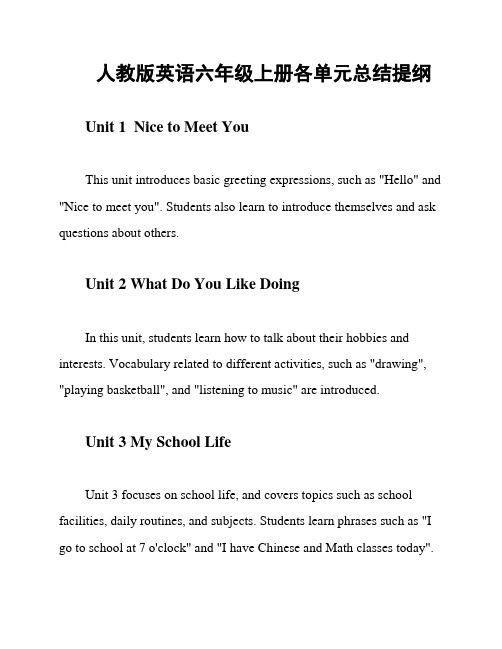
人教版英语六年级上册各单元总结提纲Unit 1 Nice to Meet YouThis unit introduces basic greeting expressions, such as "Hello" and "Nice to meet you". Students also learn to introduce themselves and ask questions about others.Unit 2 What Do You Like DoingIn this unit, students learn how to talk about their hobbies and interests. Vocabulary related to different activities, such as "drawing", "playing basketball", and "listening to music" are introduced.Unit 3 My School LifeUnit 3 focuses on school life, and covers topics such as school facilities, daily routines, and subjects. Students learn phrases such as "I go to school at 7 o'clock" and "I have Chinese and Math classes today".Unit 4 My FamilyIn this unit, students learn vocabulary related to family members such as "father", "mother", "grandpa", and "grandma". They also learn how to talk about family members' occupations and daily routines.Unit 5 On the FarmUnit 5 teaches students about animals and life on the farm. Vocabulary related to different farm animals such as "cow", "duck", "sheep", and "chicken" are introduced. Students also learn how to describe various actions of the animals.Unit 6 At the TableThis unit teaches students vocabulary related to food and mealtimes, such as "breakfast", "lunch", and "dinner". Students also learn to express their food preferences and ask about others' preferences.Conclusion。
小学六年级(上)英语课程纲要 -
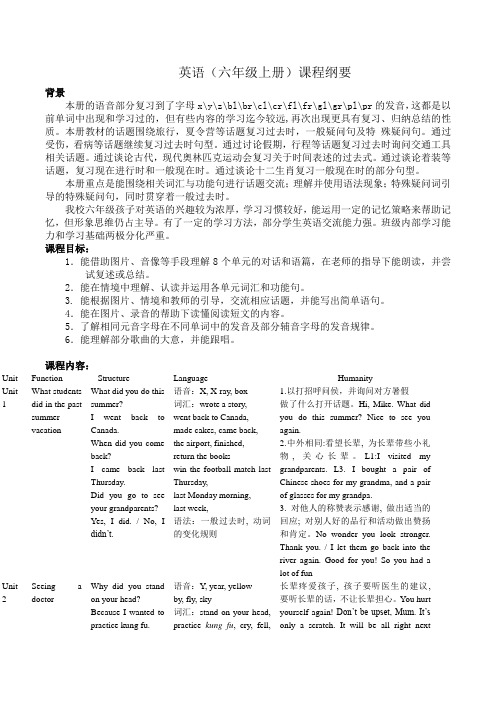
英语(六年级上册)课程纲要背景本册的语音部分复习到了字母x\y\z\bl\br\cl\cr\fl\fr\gl\gr\pl\pr的发音,这都是以前单词中出现和学习过的,但有些内容的学习迄今较远,再次出现更具有复习、归纳总结的性质。
本册教材的话题围绕旅行,夏令营等话题复习过去时,一般疑问句及特殊疑问句。
通过受伤,看病等话题继续复习过去时句型。
通过讨论假期,行程等话题复习过去时询问交通工具相关话题。
通过谈论古代,现代奥林匹克运动会复习关于时间表述的过去式。
通过谈论着装等话题,复习现在进行时和一般现在时。
通过谈论十二生肖复习一般现在时的部分句型。
本册重点是能围绕相关词汇与功能句进行话题交流;理解并使用语法现象;特殊疑问词引导的特殊疑问句,同时贯穿着一般过去时。
我校六年级孩子对英语的兴趣较为浓厚,学习习惯较好,能运用一定的记忆策略来帮助记忆,但形象思维仍占主导。
有了一定的学习方法,部分学生英语交流能力强。
班级内部学习能力和学习基础两极分化严重。
课程目标:1.能借助图片、音像等手段理解8个单元的对话和语篇,在老师的指导下能朗读,并尝试复述或总结。
2.能在情境中理解、认读并运用各单元词汇和功能句。
3. 能根据图片、情境和教师的引导,交流相应话题,并能写出简单语句。
4.能在图片、录音的帮助下读懂阅读短文的内容。
5.了解相同元音字母在不同单词中的发音及部分辅音字母的发音规律。
6.能理解部分歌曲的大意,并能跟唱。
课程内容:Unit Function Structure Language HumanityUnit 1 What studentsdid in the pastsummervacationWhat did you do thissummer?I went back toCanada.When did you comeback?I came back lastThursday.Did you go to seeyour grandparents?Yes, I did. / No, Ididn’t.语音:X, X-ray, box词汇:wrote a story,went back to Canada,made cakes, came back,the airport, finished,return the bookswin the football match lastThursday,last Monday morning,last week,语法:一般过去时, 动词的变化规则1.以打招呼问侯,并询问对方暑假做了什么打开话题。
陕旅版六年级上册英语复习提纲

陕旅版六年级上册英语复习提纲一.重点句子句型Unit 11. -What are you doing, Wu Chen? - I’m having a rest.2. But it’s time to learn English.3. It doesn’t matter.4. Take out your English book, please.5. I’m afraid you can’t.6. I’ll play the violin right now.7. On Saturday morning, Li Shan always gets up at half past six.8. She plays it for an hour.9. You’ll have no time to have breakfast.10. Then she brushes her teeth and washes her face.Unit 21.You look healthy.2.I always eat healthy food and I like sports.3.--How often do you drink milk? -- I drink milk every day.4.My mom says it’s good for me.5.She goes to bed early and sleeps nine hours every night.6.She goes skating twice a week and goes boating in the park once a month.7.Kitty’s favorite sport is ping-pong.8.She does well in her study because she eats well, sleeps well and plays well.9.I don’t like fruits or vegetables.10.--How often does she play tennis? --She plays tennis twice a week. Unit 31.What’s the matter? = What’s wrong? = what’s up? (with you)2.Some more soup, dear?3.But I have no time. I have to clean my bike.4.Why not go in your dad’s car?5.We shouldn’t drive the car today.6.It’s time to do something for our earth.7.Why? Because today is World Car Free Day.8.We all live on the earth.9.There are a lot of trees, flowers, rivers and mountains on the earth.10.But sometimes we do bad things to it.11.We cut down too many trees and waste too much water.12.We have only one earth. We should care for it.13.We should do something to make the water and the air clean again. Unit 41.--What do you often do on weekends?-- I usually go to the park and fly a kite.2.Are you free next Saturday?3.Let’s go on a picnic at the foot of the mountains.4.Why not have the picnic in the park? Good idea.5.Shall we meet at the gate of the park?6.What shall we take?/When shall we meet?/Where shall we meet?7.We shall get to the park early and come back early.8.The children would like to go on a picnic at the foot of the mountains.9.Would you like some chicken? No, thanks.10.How about going to the Old People’s Home?11.I’d like an apple.12.Alice is taking the food out of the basket.13.I’m a little hungry.Unit 51.What a heavy rain.2.It was here just now.st night, they were under your bed.4.It was in front of the house yesterday.5.I’m afraid it was lost. You have to walk to school today.6.Were you at this school thirty years ago? Yes, I was. /No, I wasn’t.7.Was there a library? Yes, there was./ No, there wasn’t.8.Were there any trees? Yes, there were. / No, there weren’t.9.But there weren't so many books in it.10.But the school was small at that time.Unit 61.What did you do last weekend? I did some housework.2.They were busy. My father had some work to do. He went away from home early in the morning.3.She was in the hospital. My grandma was ill and my mother looked after her there.4.She is better now.5.I went to see some friends and we had a football match.6.What show did you watch? I watched a show about a Shaanxi girl.7.What happened to her? When she was 8 years old, her mother was ill in bed. She did all the housework by herself.8.She looked after her mother for some years.9.And she did very well in her study.10.What a good girl!Unit 71.Did you go out to play last weekend? No, I didn’t.2.I stayed at home.3.I learned to cook and made a big cake by myself.4.I flew to Hainan with my family.5.I swam in the sea and played beach volleyball with my uncle and cousin.6.Sounds interesting. Did you eat any sea food?7.They went there by train and stayed in Beijing for three days.8.They took many photos there.9.On the first day,... The next day,... The last day… 第一天……第二天……最后一天……10.They really had a good time.Unit 81.What do you think of our party? It was great.2.They acted it well.3.I think everyone had a good time.4.At seven o’clock, everything was ready.5.There were many colorful lights and balloons in it.6.At the beginning, all the students sang Happy New Year together.7.Then, Li Shan and Wu Chen acted a short play about a poor girl. It made many students cry.8.After that, Liu Zhaoyang told a joke. It was funny and made everyone laugh.9.Finally, the students played some games. Everyone was excited.10.It was really a great party.11.Class One had a New Year’s party on December 31st.二.语法回顾1. there be句型的一般过去时运用一般疑问句---Was/Were (+冠词) +名词... ?---Yes, there was/were. / No, there wasn’t / weren’t.陈述句---There was/were +某人/某物+某地(+过去的时间)。
人教版六年级英语上册1-6单元知识点总结(A3)

六年级上全册复习提纲Unit1 How can I get there?一、词汇二、问地点(where)二、询地点(where)Where is the +地点Where is the cinema? 电影院在哪?回答:near(附近)next to(旁边)It’s behind(后面)the +地点in front of(前面)It’s near the zoo. 它在动物园附近。
It’s far from here. 它离这里很远三、指引路(how)询问怎样到达一个地点:How can I get to the +地点How can I get there(那儿)/ here(这儿)?例:How can I get to the cinema? 我怎样到达电影院?回答:①turn left / turn right at the +地点go straightTurn right at the zoo. 动物园右转。
Turn left at the zoo, and then go straight, the cinema ison your left. 动物园左转,然后直走,电影院在你的左边。
②You can take the No.57 bus. 你可以乘坐57路公交车。
人+can+take the No.数字+ busUnit2 Unit 2 Ways to go to school一、词汇二、询问出行方式(how)①——How do you go/come to school ? 你怎样去/来上学?——I go/come to school on foot . 我走路去/来上学。
②——How does your father go to work ? 你父亲怎样去上班?——He goes to work by subway . 他坐地铁去上班。
三、交通规则(traffic rules )①obey traffic lights(遵守交通信号灯)Stop at a red light . 红灯停Stop and wait at a yellow light . 黄灯停下并等候Go at a green light . 绿灯行②某人+ must + 动词原形某人必须……People on bikes must wear one. 骑自行车的人必须戴一个。
英语教学大纲:六年级上学期
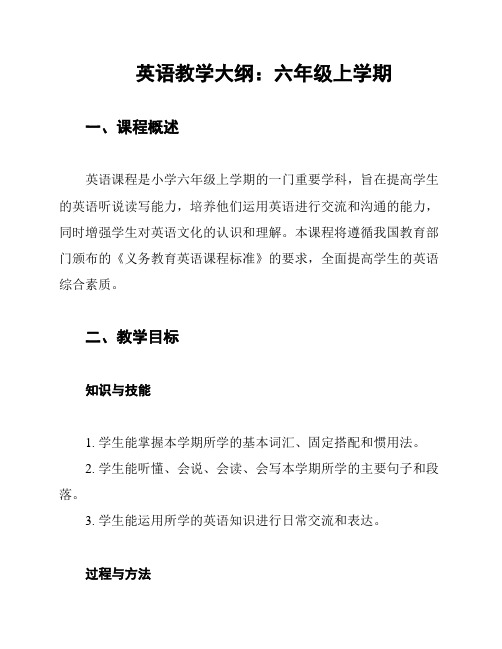
英语教学大纲:六年级上学期一、课程概述英语课程是小学六年级上学期的一门重要学科,旨在提高学生的英语听说读写能力,培养他们运用英语进行交流和沟通的能力,同时增强学生对英语文化的认识和理解。
本课程将遵循我国教育部门颁布的《义务教育英语课程标准》的要求,全面提高学生的英语综合素质。
二、教学目标知识与技能1. 学生能掌握本学期所学的基本词汇、固定搭配和惯用法。
2. 学生能听懂、会说、会读、会写本学期所学的主要句子和段落。
3. 学生能运用所学的英语知识进行日常交流和表达。
过程与方法1. 学生能通过听、说、读、写等多种方式,全面提高英语应用能力。
2. 学生能在实际情境中运用所学知识,提高实际交际能力。
3. 学生能通过小组合作、讨论等方式,培养团队协作和自主研究能力。
情感态度与价值观1. 学生能对英语研究保持积极的态度,培养良好的研究惯。
2. 学生能尊重和理解英语文化,提高跨文化交际意识。
3. 学生能在实际生活中运用英语,体验到英语研究的乐趣和实用价值。
三、教学内容本学期的英语教学内容主要包括以下几个方面:1. 词汇:本学期所学词汇涉及生活中常见的动植物、颜色、数字、方向等基本词汇,以及与日常生活、学校、家庭、人物、职业等相关的词汇。
2. 语法:学生将研究一般现在时、一般过去时、一般将来时等基本时态,以及形容词和副词的比较级和最高级等语法知识。
3. 功能:学生将学会如何用英语进行问候、介绍自己、询问时间、表达喜好等日常交流功能。
4. 听力:学生将通过听故事、对话、短文等形式,提高英语听力理解能力。
5. 口语:学生将通过模仿、角色扮演、小组讨论等形式,提高英语口语表达能力。
6. 阅读:学生将阅读故事书、说明文、叙述文等不同体裁的英语文章,提高阅读理解能力。
7. 写作:学生将练写日记、书信、故事等不同类型的英语作文。
四、教学方法本学期英语教学将采用以下方法:1. 任务型教学法:通过设计各种真实的任务,让学生在完成任务的过程中运用英语,提高实际交际能力。
英语作文提纲六年级

My School Life in Grade SixSchool life in Grade Six is a unique and enriching experience that shapes our growth and development. As we approach the end of our primary school journey, we are faced with new challenges and opportunities that prepare us for the transition to secondary school.In Grade Six, the academic workload increases significantly. We are introduced to more complex subjects and are expected to demonstrate a deeper understanding of the concepts taught. The teachers are extremely supportive and encourage us to ask questions and seek clarification whenever we encounter difficulties. They also provide additional resources and tutorials to help us master the material.Apart from academics, Grade Six also offers a range of extracurricular activities that promote our overall development. We participate in sports events, cultural festivals, and other fun activities that not only keep us physically active but also foster our creativity and team spirit. These experiences teach us valuable lessons about cooperation, leadership, and resilience.The friendships we forge in Grade Six are particularly strong and lasting. We spend a significant amount of time together, studying, playing, and sharing our thoughts and feelings. These bonds of friendship provide us with a sense of belonging and support that is crucial during this transitional period.Looking back, I am grateful for the opportunities and challenges that Grade Six has brought me. It has been a year of growth and discovery, where I have learned not only academic knowledge but also valuable life lessons. I am excited about what the future holds and am confident that the skills and experiences I have gained in Grade Six will help me succeed in secondary school and beyond.**我的六年级学校生活**六年级的学校生活是一段独特而丰富的经历,它塑造着我们的成长与发展。
六年级上册英语作文教学提纲

资料收集于网络,如有侵权请联系网站删除资料收集于网络,如有侵权请联系网站删除word 可编辑可编辑六年级上册英语作文六年级上册英语作文一、介绍你和家人上学或上班的方式一、介绍你和家人上学或上班的方式I go to school on foot. My sister goes to school on foot, too. My brother goes to school by bike. My father goes to work by car. My mother goes to work by bike.二、介绍你和朋友各自上学的方式。
、I go to school by bus. My friend Amy goes to school on foot. John goes to school by bike. Mike goes to school by subway. Sarah goes to school by bus.三、看图,说说你怎样去电影院三、看图,说说你怎样去电影院I go to the cinema. I start from here. Go straight for five minutes. Then turn le at the library. Go straight for one minute. The library is on the right.四、读读下周末你和朋友的计划。
四、读读下周末你和朋友的计划。
I ’m going to have a busy weekend with my friends. On Saturday morning, we are going to go shopping. On Saturday a ernoon, we are going to the park. On Sunday morning, we are going to go fishing. On Sunday a ernoon, we are going to climb mountains. We will be happy.五、说说这个星期天,你和家人的安排。
六年级上册英语单词词汇表教学提纲

Unit4
film
电影
studies
(study的第三人称单数形式)学习
see a film
看电影
puzzle
谜
trip
旅行
hiking
远足
take a trip
去旅行
pen pal
笔友
supermarket
超市
hobby
业余爱好
evening
晚上;傍晚
jasmine
茉莉
tonight
在今晚
idea
university
大学
wrong
有毛病
gym
体育馆
should
应该
if
如果
feel
觉得;感到
reporter
记者
well
健康;身体好
use
使用
sit
坐
type
打字
grass
草坪
quickly
迅速地
hear
听见
secretary
秘书
ant
蚂蚁
Unit6
worry
担心;担忧
angry
生气的
陷住;无法移动
afraid
害怕
mud
泥
sad
难过的
pull
拉;拽
worried
担心的;发愁的
everyone
每人
happy
高兴的
see a doctor
看病
wear
穿
more
更多的
deep
深的
breath
呼吸
take a deep breath
外研社版三起小学英语六年级上册复习提纲 短语+句型
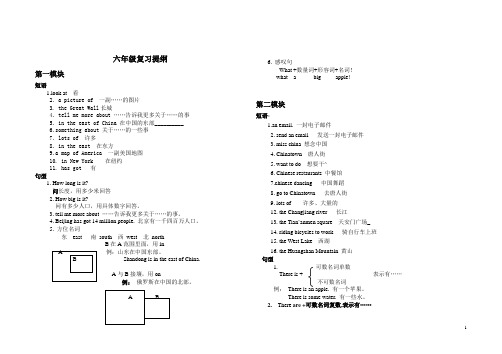
六年级复习提纲第一模块短语1.look at 看2. a picture of 一副……的图片3. the Great Wall 长城4. tell me more about ……告诉我更多关于……的事5. in the east of China 在中国的东部__________6.something about 关于……的一些事7. lots of 许多8. in the east 在东方9.a map of America 一副美国地图 10. in New York 在纽约11. has got 有句型1. How long is it?问长度,用多少米回答 2. How big is it?问有多少人口,用具体数字回答。
3. tell me more about ……告诉我更多关于……的事。
4. Beijing has got 14 million people. 北京有一千四百万人口。
5. 方位名词 东 east 南 south 西 west 北 northB 在A 范围里面,用in例:山东在中国东部。
Shandong is in the east of China.A 与B 接壤,用on例: 俄罗斯在中国的北部。
6. 感叹句What +数量词+形容词+名词! what a big apple!第二模块 短语: 1.an email. 一封电子邮件 2. send an email 发送一封电子邮件3. miss china 想念中国4. Chinatown 唐人街5. want to do 想要干^6. Chinese restaurants 中餐馆7.chinese dancing 中国舞蹈8. go to Chinatown 去唐人街9. lots of 许多、大量的12. the Changjiang river 长江 13. the Tian ’anmen square 天安门广场_ 14. riding bicycles to work 骑自行车上班 15. the West Lake 西湖 16. the Huangshan Mountain 黄山 句型 1. 可数名词单数 There is + 表示有…… 不可数名词 例: There is an apple. 有一个苹果。
六年级英语上册人教版第56页内容
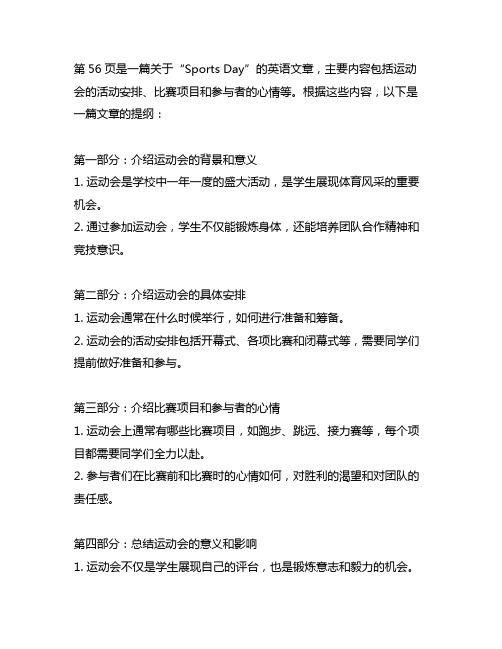
第56页是一篇关于“Sports Day”的英语文章,主要内容包括运动会的活动安排、比赛项目和参与者的心情等。
根据这些内容,以下是一篇文章的提纲:第一部分:介绍运动会的背景和意义1. 运动会是学校中一年一度的盛大活动,是学生展现体育风采的重要机会。
2. 通过参加运动会,学生不仅能锻炼身体,还能培养团队合作精神和竞技意识。
第二部分:介绍运动会的具体安排1. 运动会通常在什么时候举行,如何进行准备和筹备。
2. 运动会的活动安排包括开幕式、各项比赛和闭幕式等,需要同学们提前做好准备和参与。
第三部分:介绍比赛项目和参与者的心情1. 运动会上通常有哪些比赛项目,如跑步、跳远、接力赛等,每个项目都需要同学们全力以赴。
2. 参与者们在比赛前和比赛时的心情如何,对胜利的渴望和对团队的责任感。
第四部分:总结运动会的意义和影响1. 运动会不仅是学生展现自己的评台,也是锻炼意志和毅力的机会。
2. 运动会还能促进学生之间的交流和增进友谊,是学校教育中不可或缺的一部分。
通过以上提纲,可以写出一篇高质量、流畅易读、结构合理的关于运动会的文章。
文章通过介绍运动会的背景和意义、具体安排、比赛项目和参与者的心情,以及总结其意义和影响,对读者进行了全面深入地介绍。
文章语气正式客观,篇幅大于3000字,使得读者能够全面了解运动会的重要性和丰富多彩的活动内容。
第四部分:总结运动会的意义和影响1. 运动会的意义运动会是学校中一项重要的活动,它不仅是体育锻炼的机会,更是培养学生团队意识和合作精神的评台。
在运动会上,学生们可以学会尊重对手、团结合作,这些品质对于他们未来的成长至关重要。
运动会也是一次跨学科的体验,学生们在各个项目中可以将课堂上所学的知识运用到实践中,比如物理学的力学原理、数学的运算技巧等。
这种将理论知识与实际应用相结合的经历,可以更好地激发学生对学习的兴趣,让他们知识的应用更加灵活。
2. 运动会的影响参加运动会对学生的身心发展有着积极的影响。
- 1、下载文档前请自行甄别文档内容的完整性,平台不提供额外的编辑、内容补充、找答案等附加服务。
- 2、"仅部分预览"的文档,不可在线预览部分如存在完整性等问题,可反馈申请退款(可完整预览的文档不适用该条件!)。
- 3、如文档侵犯您的权益,请联系客服反馈,我们会尽快为您处理(人工客服工作时间:9:00-18:30)。
Unit 5
一词型转换
1this—(复数)(对应词)2that /-(复数)(对应词)
3it/he/she--(复数)4 these-(对应词)(单数)picture--(对应词)photo--(复数)
here--(对应词)aren’t--(同音词)
二短语
1我朋友简2一张你的家人和朋友的照片
三句子
1你有一个棒球吗?是的不
2他有一个棒球吗?是的不
3那听起来有趣。4我们在同一个学校并且我们都爱足球。
5我和我朋友在学校踢足球。
6我热爱足球,但是我不参与-我只是在电视上观看它们。
7这对于我来说很容易。8Tom总是上学迟到。
四语法
1play +球类打篮球play basketball
2主语是第三人称单数动词用三单(be用is,其余动词变化和名词变复数一样)
三句子
1你喜欢西红柿吗?是的不
你喜欢西红柿吗?是的不
2他喜欢西红柿吗是的不
3我们不喜欢汉堡。4他不喜欢汉堡。
5早饭你喜欢吃什么?6晚饭你喜欢吃汉堡?
7我不想变胖。David问排球明星Cindy Smith她的饮食习惯。
Unit 10
一词性转换
1big(反义词)2 short(反义词)3 woman(复数)4 come(反义词)5boy(复数)(三单)6 sell(反义词)(名词)
第二部分语法
1be动词2否定句3一般疑问句4划线提问5名词变复数6动词三单7代词8动词(1)want to do(2)let sb do sth(3)like doing /to do(4)thanks for doing(5)what about doing(6)must情态动词,没有人称和世态的变化,后跟动词原形。I must have fruit .He must have fruit .(7)need to do和need do(情态动词)(8)some后跟可数名词和不可数名词(9)My socks are on the bed .A pair of socks
Unit 1
一
1 hi(同义词)I am=
二句子
1早上好2下午好3晚上好
4你好吗我很好,谢谢。你好吗?
Unit 2
一词性转换
1this(对应词)(复数)2 what is =3it is =4key(复数)
二短语
1用英语2一个桔子
3一本英语书一个英国女孩一张地图一张中国地图
三句子
1这个用英语怎么说这是一件夹克衫。
U6
一词形转换
1 box(复数)2 dictionary(复数)3 watch(复数)4 library(复数)
二短语
1一块橡皮2一封电子邮件3怎么样4一块橡皮
5一个学生卡
三句子
1这/那是你的铅笔吗是的不
2这/那是你叔叔吗?是不是
3那些是你的铅笔吗是不是
4那些是你叔叔吗?是不是
5去老师那里拿。
6我必须找到它。
他们主格宾格形物代名物代
yes(反义词)one(序数词)first(反义词)phone(同义词)to(同音词)1 2
二短语
1电话号码我的电话号码他的电话号码2我朋友Tom的朋友
3在中国4中学5一张身份证6名字
姓氏1 2
三句子
1你叫什么名字?
我叫Alan .(2)
2他/她叫什么名字?
3他是杰克吗?
4你的电话号码是多少?5汤姆的电话号码是多少?
I watch TV every day . He watches TV every day .
Unit 9
一词形转换
1 tomato(复数)2strawberry(复数3健康(名词)(形容词)
二短语
1考虑2一个鸡蛋3吃早饭4问排球明星她的饮食习惯5晚饭后6想变胖7健康的食物8吃得好9体育明星10一些苹果一些鸡肉
2问某物的位置用Where is/are提问例地图在哪?Where is the map ?
Unit 8
一词形转换
1do(三单)2 have(三单)3 sound(三单)4 watch(三单)5love(同义词)6play(三单)7 go(三单)8 difficult(反义词)
二短语
1让某人做某事2打篮球3听起来有趣4一本有趣的书5上学迟到6玩电子游戏7看电视8去同一所学校9下课后10在电视上看体育节目11在同一所学校12我同学一起打乒乓球
3两张我家人的漂亮照片
4在第一张照片5在下一张照片6我的狗的名字(2个)
7一个姑姑8一个叔叔
三句子
1这是我朋友简2那些是我的父母。
3她是谁?她是我姐姐。
4这有一张我的全家福。5这有两张我家人的漂亮照片。
6They are my mother’s sisters .They are my a_____ .
7请拨1234567找我
Unit 7
一词形转换
1where is = 2no(同音词)3 radio(复数)everywhere(同义词)
二短语
1在沙发上在我沙发上3在桌子底下4在爷爷奶奶房间里5飞机模型
三语法
1表达某物的位置用物+be +介词短语.例:我的一本词典在桌子上。My dictionary is on the desk .
Is on the bed .
二短语
1需要一件上学穿的毛衣
2三美元两双。
3给你
4在我们大卖场
5以优惠的价格
6紫色的裙子(2)
7一双袜子
两双袜子
8这件T恤多少钱?(2)
9这些袜子多少钱?(2)
10您要买点什么吗?(2)
11你想要什么颜色的?
12我们在大卖场,快来买衣服吧!
13我们有绿色的毛衣——仅售15美元。
14对于女孩来说,我们有仅售20美元的紫色裙子。
2那个用英语怎么说那是个杯子。
3请拼写它
Unit 3
一短语
1什么颜色2黑白相间
黄色和蓝色加在一起是什么颜色?
钥匙是黄色的
Unit 4
一词形转换
1 am/is (复数)
我主格宾格形物代名物代你主格宾格形物代名物代
他主格宾格形物代名物代她主格宾格形物代名物代
我们主格宾格形物代名物代你们主格宾格形物代名物代
